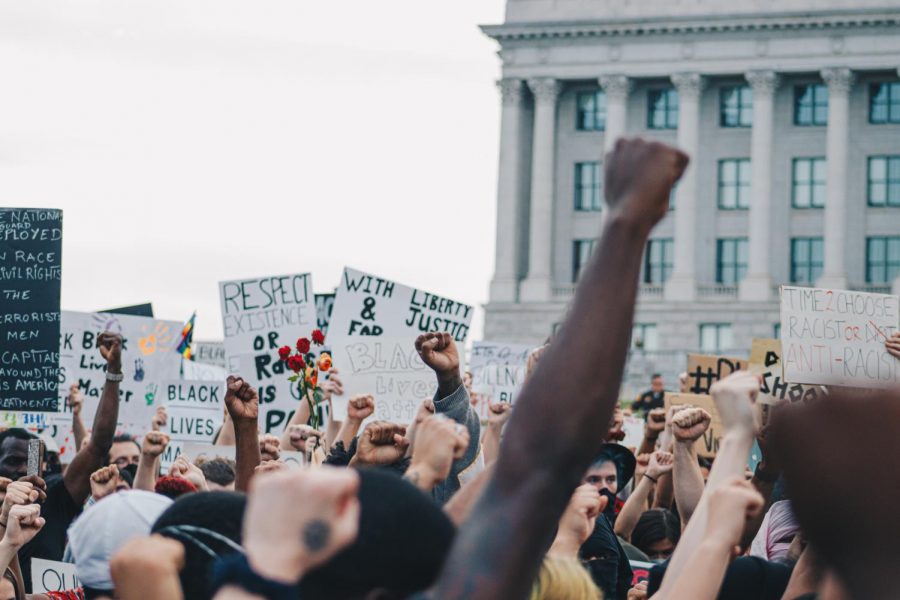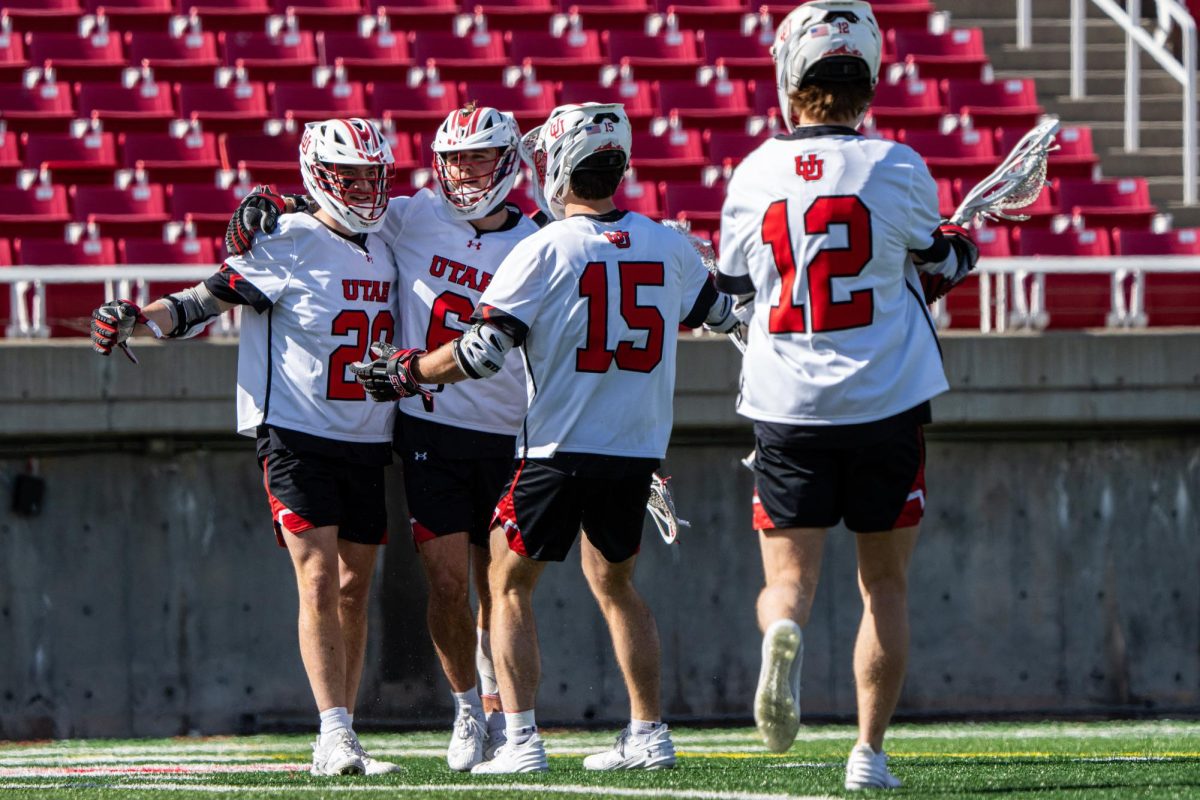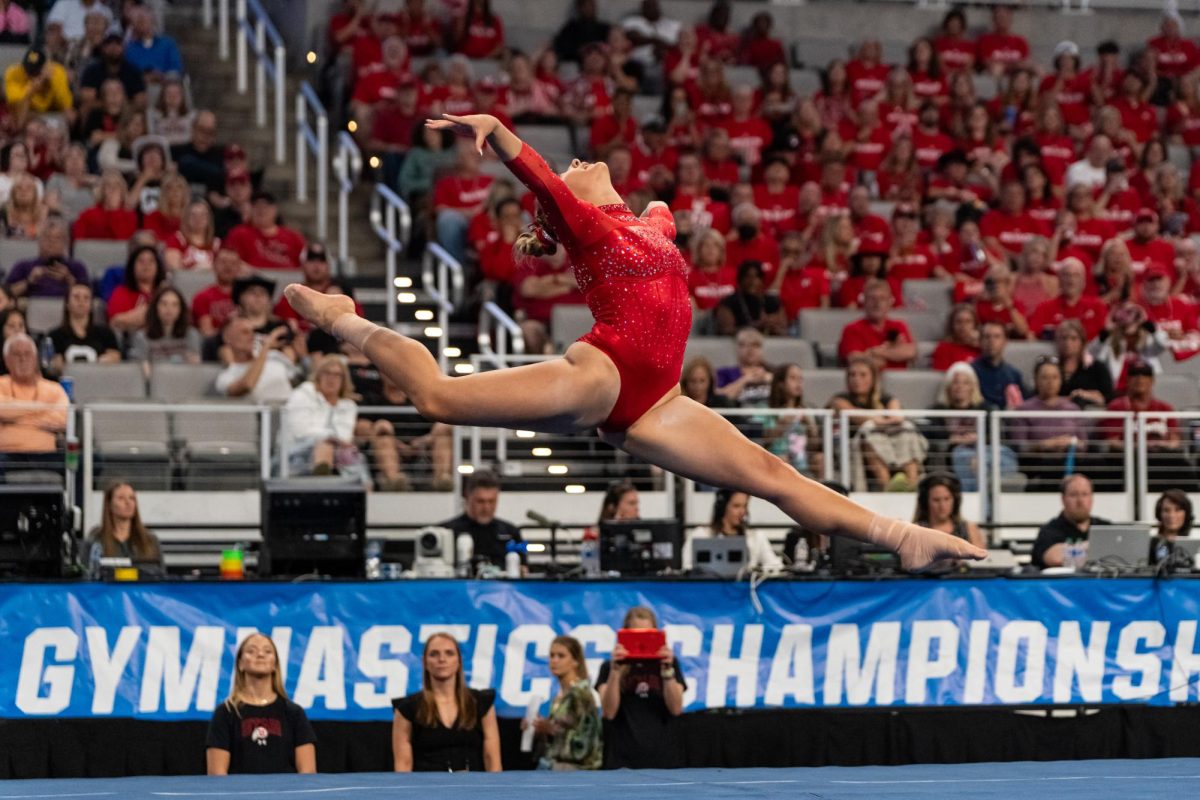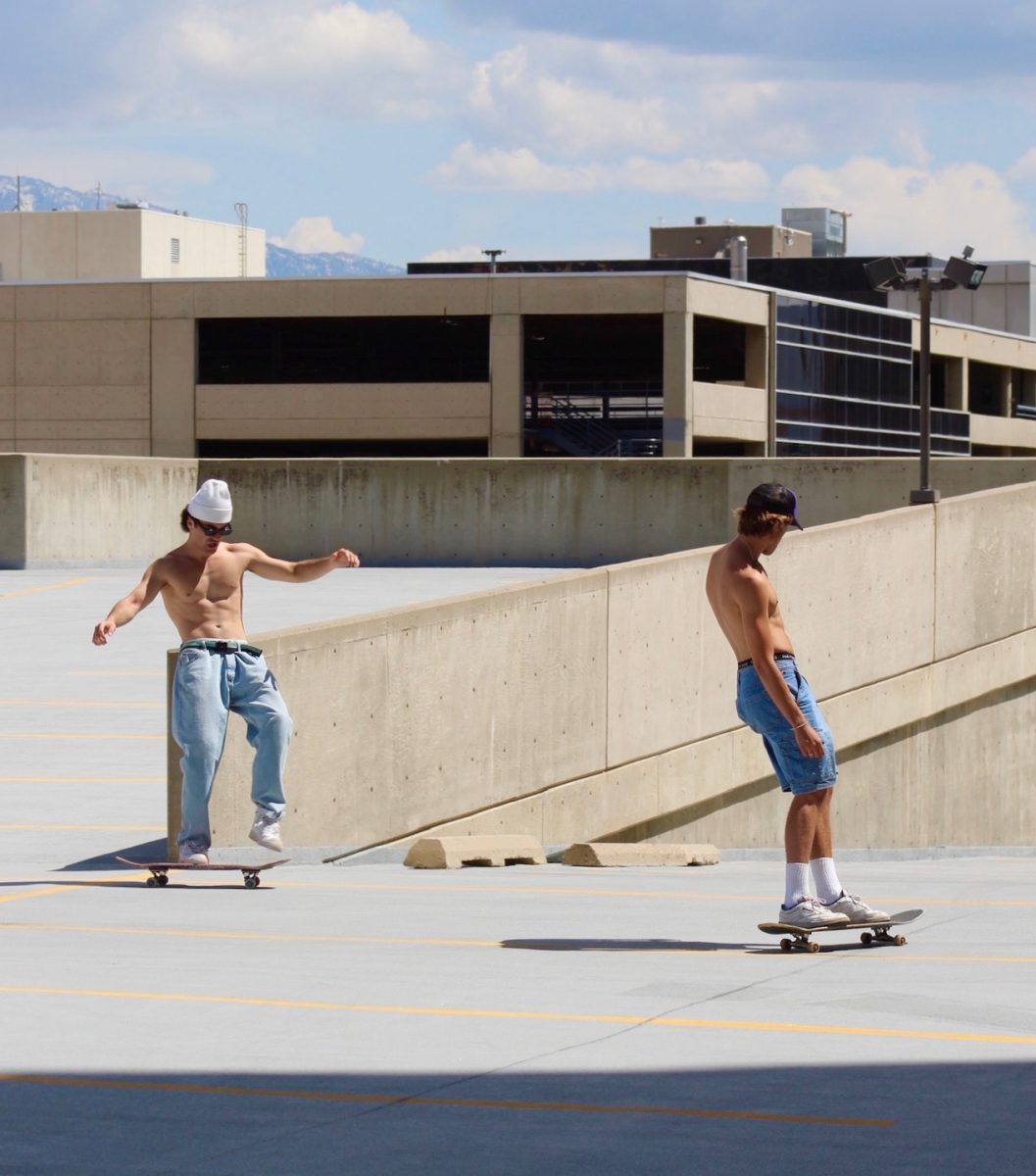Joint Resolution 2 Passes Unanimously in the ASUU Assembly After Black Students at the U Share Personal Experiences with Racism on Campus
Demonstrators raise their fists in solidarity with the Black Lives Matter movement in front of the Utah State Capitol Building in Salt Lake City, Utah, June 4, 2020. (Photo by Mark Draper | Daily Utah Chronicle)
July 23, 2020
On Tuesday, July 21, 2020, the Associated Students of the University of Utah general assembly meeting heard Joint Resolution 2 in support of the Black Student Union at the U. After passing in the Senate on July 16, the resolution passed in the unanimously in the assembly.
Last week, when the ASUU senate discussed Joint Resolution 2, some participants called out the racism occurring in the incessant questioning of the Black women authors of the resolution. In the end, the resolution passed with only one senator opposed, Seodam Kwak — the same senator who had been called out for his word choice and style of questioning the authors.
During the public comment period at Tuesday’s general assembly meeting, several references were made to last week’s senate meeting.
“I also want to laud the authors for their literal infinite patience and dedication to this process, especially considering the frankly ridiculous senate proceedings last week,” said Sri Radhakrishnan, a soon to be first-year medical student and alum from the U.
The public comment period was also filled with students of color at the U expressing their support for the resolution and sharing their personal experiences with racism on campus.
“I urge you to affirm this bill for the following reasons: on day one of orientation for me, I was ridiculed for my name and almost barred from attending engineering orientation because the supervisor at the door couldn’t believe that my name would be on the list of students to be allowed in; further into the fall semester, a cashier at Gardner Commons told me that he loves my crazy hair, for reference indicating how pitiful this statement was, I was wearing my hair in a natural afro that day,” said Thandi Msiska, a second-year student and vice president of the National Society of Black Engineers at the U.
Msiska continued on to explain how the U has consistently failed to take anti-racist action to protect its Black students. “These are perfect reflections of the U’s century-long lag on the anti-racism effort. Being Black at the U is arguing with gatekeepers on day one about your right to be here, having your natural appearance alienated, and now as evidenced through the previous senate hearing, being blatantly gaslit for your own experiences,” Msiska said.
Other students spoke about their personal experiences with racism as well.
“I shouldn’t have to trek 30 minutes in the blazing sun or trek 30 minutes through snow just to get to the Black cultural center to be around people who understand me and have my best interest at heart. Me and my fellow E-Board members shouldn’t have to scrape near the bottom of the pot, shouldn’t be paying out of our near-empty pockets to take care of the African and African American student population, earning diversity benefits off of our diversity,” said Yos Onwukeme, a geological engineering student and a member of the E-Boards for both the BSU and African Student Association.
Some members of the community expressed the time and energy they spend dealing with racism on campus.
“The Black experience at the university can be traumatic, tiring and stressful, to say the least. Oftentimes we spend our time thinking about racist incidents that happened in class, the lack of academic and financial resources, and being the 1% of the population,” said Barbara Kufiadan, a class of 2019 alum and chair of the Black Alumni Community and co-founder of the Black Cultural Center.
Another student, Akilah Woodford-Sims, an incoming sophomore majoring in psychology and minoring in chemistry, said being a Black woman on campus is already two strikes against her. She shared that being a part of the minority on campus is hard enough, but not having the necessary resources shared during orientation adds to the difficulty.
“Last year, as an incoming freshman, I was not made aware of resources, programs or ethnic student groups that would allow me to have more of a comfortable college experience. Those opportunities are not discussed during orientation, meanwhile, extra time is carved out to discuss sexual misconduct and the importance of maintaining a dry campus,” Woodford-Sims said.
Another student, Elvis Amin, commented on the U’s exploitation of Black students with half of the U’s Black student population participating in athletics. “The University profits off of Black students as you can see from the football team, basketball team, to many other athletics, so they are making money off of us but they’re not really reinvesting back into us,” Amin said.
Daniel Chavez-Yenter, a second-year doctoral student, research assistant and public health practitioner said not supporting the resolution could be considered a microaggression as it serves to invalidate the lived experiences of some Black students on campus. “It is really important that we consider this as it can have a negative impact on their health overall, especially as it initially can have deterioration of a mental state of an individual; it has been linked to elevated levels of depression, suicide, anxiety, and trauma among BIPOC students. It is categorized as a death by a thousand cuts,” Chavez-Yenter said.
The negative psychosocial, physical and mental effects of microaggressions have been termed “racial battle fatigue” by a professor at the U, Dr. William Smith. Smith studied the stress of Black men on historically white campuses and found that racial microaggressions led to various mental and physical health effects that impacted that individual’s ability to function as well as they could have.
Wendy Joseph, a student involved in Greek life, also shared personal experiences in dealing with sororities. “My own date was asking me for three times to entertain blackface at one of the events that we had, is an issue, and that wasn’t resolved either. The fact that we have professors putting in their assignments to find a ‘subordinate member of society’ when they mean to say ‘marginalized’ or ‘underrepresented’ is an issue,” Joseph said.
Other students expressed that they have had to pull white supremacist posters down on campus or listen to a presentation about being professional in which the presenter said that ‘natural hair’ was unprofessional.
After public comment, the meeting moved into a questioning period for representatives and ex officios.
The first question came from ex officio Kaitlin McLean who asked the authors of the resolution if they felt represented in the last senate meeting.
“I was grateful for everyone who was working to counteract the racist comments that were made against us as Black women and Black authors. I was very grateful for the debate because it allowed some people who may not have been able to see and understand what racism is in its purest form,” said Elon Darthard, one of the authors of the resolution.
After a few more questions, the meeting moved into a debate period.
“I want to make sure that you all understand how hard it is for us to be in this meeting and to talk to you about these things, knowing that anyone can watch this and they will see our faces,” said representative Gabe Misla of the college of fine arts and sponsor of the resolution.
Many members of the public, the authors of the resolution and ASUU representatives expressed their strong support for the bill without amendments in an effort to respect and uplift the voices of Black students.
One representative, Hunter Mansfield from the college of engineering proposed an amendment to change recommendation #15 which originally stated, “Add a diversity course requirement to the general, required curriculum for all majors. Specifically, multiple courses on Black culture, in addition to the existing African/African-American Experiences course” to say “Add Black culture and African American experience courses that satisfy the diversity course requirement of all undergraduate majors. Ensure that Black culture is represented in at least 50% of diversity requirement coursework”.
“I understand not wanting to water down the voices of the Black Student Union, but at the end of the day, it is ASUU passing this resolution, and we are representing all the students of our colleges; we need to make decisions in their consideration… I don’t like how the bill sponsors have discouraged making any changes; if students want to have their unadulterated voices heard, there are many outlets for that,” Mansfield said.
Mansfield highlighted concerns with adding on more requirements for graduation.
“So the message is essentially the same. All this amendment does is prevent yet another bachelor’s degree requirement to put on our students. Adding another requirement would actually hurt my constituents and the entire student body, cost them thousands of dollars, making them take on more courses than they already are… that burden would fall on students individually,” Mansfield said.
Representative Devon Cantwell expressed that in order to be an anti-racist, one can not amend the statements made in the resolution. Cantwell continued on to say ASUU has never been representative of the student body, but now has the chance to uplift Black voices.
“Representative Mansfield claimed that we have a responsibility to represent all of our students. The reality is that ASUU has never represented all of our students, it has represented the most powerful and the most resourced students at our institution,” Cantwell said.
If this amendment were to be passed, the resolution would then have to go to a reconciliation committee which would eventually mean the debate process would have to occur again in both the general assembly and the senate.
Cantwell explained because of the non-binding nature of the resolution, the specifics of the language can be discussed as policy changes start to come into question.
“‘Classes’ is being used here because it is a heuristic for understanding that it would be something with a formal curriculum with actual legitimacy. ‘Workshop’ can mean a lot of things and is often not high quality or formalized in the way that BSU would like this particular class to be. The language as written still allows for a lot of flexibility about what that policy could look like in actual implementation without making the requirement meaningless right out of the gate,” Cantwell said.
Cantwell also said the cost of tuition is already hyper-inflated, so if assembly members are concerned about these new diversity courses costing them more money, they should advocate for free classes. If these classes were free, Cantwell explained, one barrier to student engagement with these courses would be reduced.
Ex officio McLean also expressed worry about members of ASUU continually refusing to accept the language Black authors have intentionally written and not listening in an appropriate manner.
“What we are saying if we pass this amendment is ‘we hear your voices, but we think our voices are a better representation of your voice than your voice, so we are going to amend it to make it better.’ I think that is a little bit offensive, frankly,” McLean said.
The motion to amend the resolution failed, and the general debate continued. After a few more comments, the meeting moved into concluding comments from the authors or sponsors of the resolution.
Maryan Shale, an author of the resolution, explained the resolution is personal for many reasons.
“I’m a Black student that gets called on in lectures when racism, disparities or Black lives are a topic because the teacher facilitating those discussions wasn’t trained or properly educated enough on our experiences. I am a Black student who has been photographed by the University to make our campus seem more diverse,” Shale said.
Shale continued on to say the U has failed to compensate any student for doing the diversity work the U should have done the moment it decided to recruit students of color.
“But I would love it even more if the white faculty members stopped asking me where I am from and instead asked me ‘how can I make your experience at the U even better?’ I would love this university even more if my white and POC constituents stopped doing blackface behind closed doors, stopped saying the n-word, stopped giving Black students a hard time,” Shale said.
After Shale spoke, another author of the resolution, Elon Darthard, shared a concluding statement.
“From all that we’ve heard during the public comment section, I hope you all are able to even slightly understand that we have had to find our voice through all of our pain, through all of our trauma, even in the midst of a racial pandemic,” Darthard said.“We are exhausted from having to change our voices, to make others feel comfortable. It stuns me that people may feel uncomfortable about this resolution and these meetings when I have had to have talks and conversations like these starting at the age of seven years old and younger.”
Darthard also brought up the questioning at last week’s senate meeting.
“Throughout the proceedings during both senate and assembly, we have been questioned at every turn. We have responded with much composure and much respect and continued a dialogue that has been going on since 2015. We are not asking you for any special privileges, we are just asking of you to have the same college experience that other students are experiencing at the U,” Darthard said.
The meeting ended with unanimous support to pass the resolution.













Jake Heiniken • Aug 11, 2020 at 10:56 am
ASUU relies too heavily on sympathy. It should be dissolved as the organization can be too easily guilted into doing some things. If it is a microaggression to vote against or debate a bill whats the point of even having a legislative body and structure in the first place? DEFUND ASUU!!!!